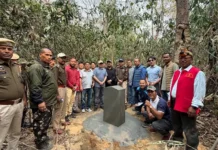[ Tage Lapung ]
One of my friends, a serious and dutiful mid-level bureaucrat in the Civil Secretariat, once lamented: “I am tired of our people drawing salary without attending duties. No one listens; babus are terrible guys!” I immediately responded with a quote: “… There is no pleasure in having nothing to do. The fun is in having lot to do and doing nothing”. This struck him a lot. He insisted me to write something about the eventual situations where thousands of educated youths are unemployed in the midst of ‘undoing employed people’ in the government; but I postponed for some popular government programmes to align with the context.
The Sarkar Aapke Dwar (SAD) is one such very popular programme which I consider as an appropriate and I am aligning it with ‘Doing the Undoing.’ This is a noble concept practiced successively by the government as a reach out programme to accelerate connectivity with the citizens in delivery of various services in a hassle free manner. The intended target to achieve through this programme, as it is seen, is delivery of services to those citizens who could not avail the government services during the normal official routines. It was nice to see the on-the-spot services like issuance of ration cards, birth and residential certificates, besides few other countable services during the SAD programmes.
Beyond those glittering and symbolic connectivity during SAD programme, there lies the paradox of a self-proving situation of the government offices, where either the officer or the staff are nowhere to be seen till 11 am, when you visit the government offices for some petty official works. To find them sitting back in the office, particular after lunch hour, becomes disguised taboo.
In the district level, the officers and officials, who are being posted in their home district, make them busy taking leaderships of their respective clan/ community organization. Such activities practically offer the salaried government employees a refusal tendency to perform their primary duty for the wellbeing of the citizens. In this given situation, the needy citizens, who visit offices for rightful services, face wilful neglect from the officers or officials posted in their home districts.
The government expanding its administrative flexibilities by creation of more new districts and new circles is in another direction of accommodating more home-postings, even for few left outs. Such initiatives are justified as ‘bringing the administration to the doorstep, and in the interest of the public’, which are really becoming un-substantive in its objective and burdensome to state budget.
The undoing habits of the government employees and crumbling culture of unmoving files does not offer any symmetry with the government slogan of ‘bringing administration to people’s doorstep.’ The SAD programme of ‘doing the undoing’ leftover jobs in people’s doorstep becomes a deceitful routine of not doing duties by the government employees in their official days.
The SAD programme will become an unessential mela, particularly in a less populated state like Arunachal, if the government employees perform their duties in normal routine days in their offices.
Should the government allow its employees to enjoy the freedom of undoing the duties during their normal office days? Should those non-performing employees be not held accountable for not delivering services to the people? Or, is the government dwindling before the numerical might of its employees? The answer must lie in its purpose.
It’s time for the government to think about its acquired culture of tolerance to its paid employees and bring a legislation to ensure responsibility and accountability in governance.
It is propitious now, that with the Arunachal Pradesh Property (Prevention of Damage and Loss) Act 2020, the government should also come out with a bill to fix employees responsibility and accountability.
(The writer is a former AAPSU leader and representative of the Centre for Policy Research, Impact Studies and Monitoring)


